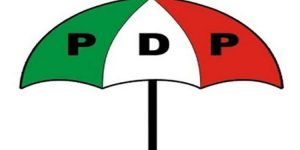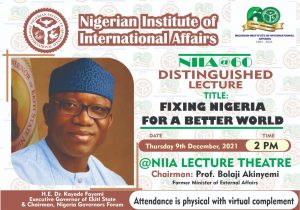It has been a harvest of more presidential aspirants this week on the platform of the ruling party, the All Progressives Congress, (APC). Comrade Adams Oshiomhole, former labour leader, former governor of Edo State in Southsouth of Nigeria as well as former National Chairman of the APC declared his ambition to be Nigeria’s next president, come May 29th, 2023. Governor Abubakar Badaru, the governor of Jigawa State in the Northwest of the country also joined the race. Not much has been heard about him before now, either as an activist of any tendency or performance in office. Then Governor Kayode Fayemi, the governor of Nigeria’s Southwest state of Ekiti, also joined.
Dr. Fayemi’s declaration can be argued to stand apart somehow. Of the aspirants so far on the platform of that particular party, two have a common feature. One is Rotimi Amaechi, Minister for Transport, who never tires in brandishing his roots in Marxism and students union politics. This is confirmed to some extent in the sense that it is advocating the students’ cause that gave him the ‘Rotimi’ name, after Rotimi Williams, the legendary Lagos lawyer then. It would have been more striking evidence if the Minister had been called ‘Fawehinmi’ who was the epitome of popular struggle rather than Rotimi Williams who was seen to be on the side of the establishment even as informed as he was. However, Rotimi Amaechi can track back. How far back remains to be seen.

To win, Dr. Kayode has to beat his co-contestants in the APC and then beat his PDP counterpart in the 2023 presidential poll!
The second is Dr. Fayemi whose activist roots are more recent and sustained. He himself did not fail to make this a cornerstone of his qualifications for national leadership in his speech while declaring his presidential ambition May 4th, 2022 in Abuja. His involvement in radical nationalism of the student movement in Nigeria in his undergraduate days to global civil society advocacy circuit in favour of democratization means he can be assumed to, on the face of it, be above the street wisdom and pedestrianism that has drained leadership of imagination and newness. The question though is how far that can take him in Nigeria of today where the activist establishment itself is not as organizationally established, with particular reference to its permeation of the larger society beyond the capacity for episodic, urban based Jacobinism.
The implication is that Dr. Kayode’s declaration has its own dialectic or paradox, if you choose: The very quality which could have given him the quality of newness with which to overwhelm his competitors more easily is also the problematic of his national leadership aspiration.
Recognizing or framing a crease as a paradox does not necessarily suggest such a crease cannot be undone. Mr. governor who seems quite aware of the discursive conditions which produce power appears to have launched the war there. Out of his moderately long declaration speech, Intervention took interest in the sentence that says all he had said were “just a few snippets of what I hope will be the core of the Nigeria agenda under my watch”.

Gov Fayemi in a previous outing
Taken together with where he also said that “I do so fully convinced on the basis of what I have experienced, heard, and seen about the demands of the times and the aspirations of our people that the agenda that I am proposing for our country is one which will find favour with APC members and win resounding traction with the generality of Nigerians”, the indicators are that Dr. Fayemi is craftily starting out from “the war of position” that can make a lot of difference.
In other words, he can resolve the paradox being posed by constituting his aspiration into popular consensus. But this is provided he is also aware that whether his agenda acquires the status of something new and popular will not depend on his discursive moves alone. Of course, revving up his representational practice of power can fix the meaning of his agenda as something qualitatively new and transformative but, the social space being a space of competing interpretations and standpoints, means that he could still fail disastrously in that.
But, as he declared in the speech, “The die is now cast”. Ordinarily, Dr. Kayode Fayemi should be the type headhunted for presidential power. The point cannot be over-emphasised that he went to a leadership grooming university, with training and/or skills for high level of abstraction which is a key requirement for governing complexity.
It is, therefore, either that Nigeria does not function that way and has, for that reason, remained where it is or that Dr. Fayemi has not himself been raising the bar – espousing one doctrine or the other, demonstrating the workability of a model or so and generally waving a banner of newness. Or he has been doing so but has not been mediated as such to popular reckoning. Of course, it is one thing to raise the bar and completely another to have been represented as a bar-raiser.
Intervention, for instance, has been grumbling that Dr. Fayemi had not been setting the agenda, intellectualizing the Nigerian crisis and exercising hegemonic influence. It is possible he has been waiting for the opportune moment. In that sense, his entry into the presidential race for 2023 would interest many in relation to the usual questions of whose candidate he is, what difference his coming will make, can he coast to victory or there is a point he is seeking to prove?




























